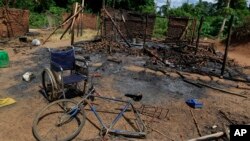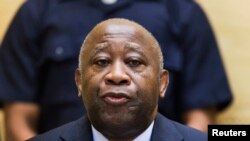ABIDJAN —
A new report from the peacebuilding body Interpeace warns western Ivory Coast continues to be vulnerable to the type of violence that killed at least 1,000 people during the 2010-11 post-election conflict.
The Interpeace report draws from more than 300 interviews and focuses on the western regions of Guemon and Cavally, which were home to the worst massacre of the post-election violence. The violence began after former President Laurent Gbagbo failed to admit defeat in the November 2010 presidential runoff vote, sparking six months of fighting the United Nations says claimed more than 3,000 lives.
According to the report, the main drivers of instability in the region include longstanding land conflicts, the role of ethnicity in politics, and the weakness of the state, especially the security forces. But the report also warns of widespread feelings of victimization among the population.
The region largely supported former president Gbagbo, and the new president - Alassane Ouattara - has been reluctant to rearm the police and the gendarmes. Instead, the military has taken the lead in providing security.
The report's lead researcher, Severin Kouame, said weak state institutions in the west fueled suspicions the government was only serving Ouattara supporters while ignoring Gbagbo supporters.
“The government must take into account its position. In the mind of certain parts of the population this government is a government of part of Ivorians. There is a need for the government, the state, to present itself as a government of all Ivorians,” said Kouame.
A prominent example of state weakness is the case of Mount Peko National Park, which is occupied by a militia group that fought on Ouattara’s side during the conflict. Since last August, officials have promised at least twice to take action against the militia, led by a native of Burkina Faso named Amade Oueremi.
Rights groups have accused the militia of carrying out grave crimes during the conflict, including playing a key role in the March 2011 massacre in the town of Duekoue, which was the single most lethal episode of the fighting. The continued impunity for Oueremi and his men has reinforced criticism that Ouattara is shielding his military backers from prosecution.
Only Gbagbo supporters have been charged, despite evidence that crimes were committed on both sides.
Kouame said Oueremi’s case captured many of the problems facing the region.
“This situation is a kind of manifestation of the collapse of the state. So the only thing to do is to reinforce the state - to reinforce the state capacity to procure security, to procure justice,” he said.
Kouame also warned the problems could emerge in other parts of the country. Although the north is a stronghold for President Ouattara, it is similarly underserved by state institutions, which could lead to some of the same problems.
“The same situation, the same factors exist in the north. When this kind of union around Mr. Ouattara will be stopped, these differences, these factors will appear. And we will have the same situation as in the west,” said Kouname.
The report on the situation in the west was produced in partnership with the U.N. Development Program.
The Interpeace report draws from more than 300 interviews and focuses on the western regions of Guemon and Cavally, which were home to the worst massacre of the post-election violence. The violence began after former President Laurent Gbagbo failed to admit defeat in the November 2010 presidential runoff vote, sparking six months of fighting the United Nations says claimed more than 3,000 lives.
According to the report, the main drivers of instability in the region include longstanding land conflicts, the role of ethnicity in politics, and the weakness of the state, especially the security forces. But the report also warns of widespread feelings of victimization among the population.
The region largely supported former president Gbagbo, and the new president - Alassane Ouattara - has been reluctant to rearm the police and the gendarmes. Instead, the military has taken the lead in providing security.
The report's lead researcher, Severin Kouame, said weak state institutions in the west fueled suspicions the government was only serving Ouattara supporters while ignoring Gbagbo supporters.
“The government must take into account its position. In the mind of certain parts of the population this government is a government of part of Ivorians. There is a need for the government, the state, to present itself as a government of all Ivorians,” said Kouame.
A prominent example of state weakness is the case of Mount Peko National Park, which is occupied by a militia group that fought on Ouattara’s side during the conflict. Since last August, officials have promised at least twice to take action against the militia, led by a native of Burkina Faso named Amade Oueremi.
Rights groups have accused the militia of carrying out grave crimes during the conflict, including playing a key role in the March 2011 massacre in the town of Duekoue, which was the single most lethal episode of the fighting. The continued impunity for Oueremi and his men has reinforced criticism that Ouattara is shielding his military backers from prosecution.
Only Gbagbo supporters have been charged, despite evidence that crimes were committed on both sides.
Kouame said Oueremi’s case captured many of the problems facing the region.
“This situation is a kind of manifestation of the collapse of the state. So the only thing to do is to reinforce the state - to reinforce the state capacity to procure security, to procure justice,” he said.
Kouame also warned the problems could emerge in other parts of the country. Although the north is a stronghold for President Ouattara, it is similarly underserved by state institutions, which could lead to some of the same problems.
“The same situation, the same factors exist in the north. When this kind of union around Mr. Ouattara will be stopped, these differences, these factors will appear. And we will have the same situation as in the west,” said Kouname.
The report on the situation in the west was produced in partnership with the U.N. Development Program.





